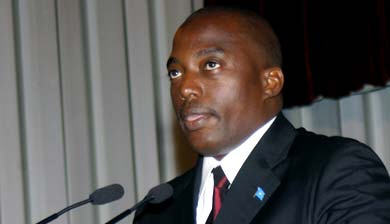 On Wednesday evening November 15 2006, the Independent Electoral Commission (IEC) announced the provisional results that make Joseph Kabila the new president of the DRC, with 58.05% of the votes, against a total of 41.95% of the votes for his presidential rival Jean Pierre Bemba.
On Wednesday evening November 15 2006, the Independent Electoral Commission (IEC) announced the provisional results that make Joseph Kabila the new president of the DRC, with 58.05% of the votes, against a total of 41.95% of the votes for his presidential rival Jean Pierre Bemba.
Jospeh Kabila gained 9,436,779 votes against 6,819,822 votes for Jean Pierre Bemba, out of a total number of 16,256,601 ballots, which represents a 65.36% turnout of the voting population.
Interestingly, Mr. Kabila only won a majority in five out of the eleven DRC provinces, with a huge Kabila vote of 2,424,975 in Katanga and a poor voting turnout in Kinshasa, a Bemba stronghold, giving him a decisive victory.
At 35 years of age, Mr. Kabila becomes the youngest democratically elected African head of state, a position he has held since the assassination of his father Laurent Kabila in 2001.
After announcing the election results last evening, the head of the IEC, Fr. Apollinaire Malu Malu, declared that the results would now be sent immediately to the Supreme Court for ratification.
The results were announced in a tense Kinshasa following the public declaration of Mr. Bemba’s political camp on Tuesday last, which denounced the partial elections results and questioned the impartiality of the IEC.
The new president appealed for ‘fraternity and tolerance, in order to show the world that the DRC is now engaged, in an irreversible manner, on the road to democracy’.
Mr. Bemba’s spokesperson Fidèle Babala said that he considered the ‘haste in which the IEC announced the results raised many questions, and threw doubt on their impartiality’.
However, the IEC indicated that that they had not received any contestations in relation to any material errors relating to the elections.
Any other disputes or contestations, according to article 73 of the electoral law, should be referred to the Supreme Court in the next three days, who will then have a further seven days to announce the final election results.
Related articles
- • Felix Tshisekedi Sworn In as DR Congo President (January 24, 2019)
- • Constitutional Court Declares Tshisekedi Winner of Presidential Election (January 19, 2019)
- • Felix Tshisekedi Vows to Be the President of All Congolese (January 10, 2019)
- • Felix Tshisekedi Elected DR Congo President (January 10, 2019)
- • DR Congo Delays Results of December Election (January 6, 2019)
- • Moise Katumbi blocked from entering DR Congo (August 3, 2018)
- • Botswana Urges Joseph Kabila to Step Down (February 26, 2018)
- • No elections in DR Congo in December without electronic voting machines: INEC (February 13, 2018)
- • US Warns DR Congo Against Electronic Voting for Delayed Election (February 12, 2018)
- • Felix Tshisekedi accuses INEC of illegally prolonging Kabila's mandate (October 24, 2017)
- • DRC Seeks Arrest of Presidential Candidate Moise Katumbi (May 19, 2016)
- • Papa Wemba Is Buried in Kinshasa (May 4, 2016)
- • Papa Wemba Awarded Highest National Honor as Thousands Pay Tribute (May 2, 2016)
- • Rights Groups: DR Congo Must Free Pro-democracy Activists (April 13, 2015)
- • Police Open Fire on Crowd Protesting Election Law Change (January 19, 2015)
- • Etienne Tshisekedi Evacuated to Belgium for Medical Treatment (August 16, 2014)
- • Kerry Calls on Kabila to Honor Constitution (May 4, 2014)
- • Kerry in DR Congo for Security Talks (May 3, 2014)
- • At least 60 killed as train derails in Katanga province (April 23, 2014)
- • DR Congo Takes Chairmanship of COMESA at Summit in Kinshasa (February 26, 2014)
- • DR Congo Honors Nelson Mandela, Hero and Model for Humanity (December 6, 2013)
- • Kabila Congratulates Congo Army for Defeating M23 Rebels (October 30, 2013)
- • DR Congo Eases Process for Starting a New Business (June 3, 2013)
- • Regional Leaders Sign DR Congo Peace Deal (February 24, 2013)
- • The M23 Rebels Want to Overthrow Kabila? Nonsense (November 28, 2012)
- • Protests Against M23 Rebels, Government and UN Spread (November 22, 2012)
- • Thousands Protest M23 Capture of Goma, Turn on Government and UN (November 21, 2012)
- • DR Congo Officials Vow to Defend Goma Against M23 Rebels (November 19, 2012)
- • At high-level meeting, Ban urges political solution to crisis in eastern DR Congo (September 27, 2012)
- • US Cuts Military Aid to Rwanda Over Support to Rebels in DR Congo (July 21, 2012)







